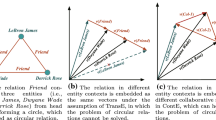Abstract
Knowledge graph (KG) embedding represents entities and relations with latent vectors, which has been widely adopted in relation extraction and KG completion. Among existing works, translation-based models treat each relation as the translation from head entitiy to tail entitiy and have attracted much attention. However, these models only utilize fact triples but ignore prior knowledge on relational type-constraints. This paper presents a generic framework to enhance knowledge graph embedding with type-constraint features (ETF). In ETF, the embedding of entity is comprised of two parts—entity-specific embedding and constraint-specific embedding. The former expresses translation features of entities, and the latter represents semantic constraints influence by linked relations. Besides, the adaptive margin-based loss is designed to learn embeddings, which effectively separates the negative and positive triples. Finally, the results on four public datasets demonstrate that ETF makes significant improvements over the baselines.







Similar content being viewed by others
References
Anuar FM, Setchi R, Lai Y-K (2016) Semantic retrieval of trademarks based on conceptual similarity. IEEE Trans Syst Man Cybern 46(2):220–233
Wang S et al (2021) KG-DTI: a knowledge graph based deep learning method for drug-target interaction predictions and Alzheimer’s disease drug repositions. Appl Intell 4
Fang Y, et al. (2020) Dynamic knowledge graph based fake-review detection. Appl Intell 50:4
Wang Q, Mao Z, Wang B, et al. (2017) Knowledge graph embedding: a survey of approaches and applications. IEEE Trans Knowl Data Eng 29(12):2724–2743
Feng J et al (2021) Novel translation knowledge graph completion model based on 2D convolution. Applied Intelligence
Do P, Phan T (2021) Developing a BERT based triple classification model using knowledge graph embedding for question answering system. Appl Intell 3
Hui B et al (2021) Personalized recommendation system based on knowledge embedding and historical behavior. Appl Intell 7
Zhang Y, Wang J, Luo J (2020) Knowledge Graph Embedding Based Collaborative Filtering. IEEE Access PP:99
Bordes A, Usunier N, García-Durán A, Weston J, Yakhnenko O (2013) Translating embeddings for modeling multi-relational data. In: Proc Adv Neural Inf Process Syst, pp 2787–2795
Zhen W, Zhang J, Feng J, et al. (2014) Knowledge graph embedding by translating on hyperplanes. AAAI press
Lin Y, Liu Z, Sun M, Liu Y, Zhu X (2015) Learning entity and relation embeddings for knowledge graph completion. In: Proc. 29th AAAI Conf. Artif. Intell., pp 2181–2187
Ji G, He S, Xu l et al (2015) Knowledge graph embedding via dynamic mapping matrix: Meeting of the Association for Computational Linguistics & the International Joint Conference on Natural Language Processing
Xie R, Liu Z, Jia J, et al. (2016) Representation learning of knowledge graphs with entity descriptions// Proc of AAAI. AAAI, Menlo Park
Zhang Z, Zhuang F, Qu M, et al. (2018) Knowledge Graph Embedding with Hierarchical Relation Structure// Proceedings of the 2018 Conference on Empirical Methods in Natural Language Processing
Krompa D, Nickel M, Tresp V (2014) Large-scale factorization of type-constrained multi-relational data// International Conference on Data Science & Advanced Analytics. IEEE
Ji G, Kang L, He S, et al. (2016) Knowledge graph completion with adaptive sparse transfer matrix. AAAI press
Han X, Huang M, Zhu X (2016) TransG : a generative model for knowledge graph embedding// Proceedings of the 54th Annual Meeting of the Association for Computational Linguistics (Volume 1: Long Papers)
He S, Kang L, Ji G, et al. (2015) Learning to represent knowledge graphs with gaussian embedding// Acm International
Xiao H, Huang M, Hao Y et al (2015) TransA: An Adaptive Approach for Knowledge Graph Embedding. Computer Science
Ren F, Li J, Zhang H et al (2020) TransP: A New Knowledge Graph Embedding Model by Translating on Positions *. IEEE
Tan Z, Zhao X, Fang Y, et al. (2018) GTrans: generic knowledge graph embedding via multi-state entities and dynamic relation spaces. IEEE Access PP:1–1
Nickel M, Tresp V, Kriegel H-P (2011) A three-way model for collective learning on multi-relational data. In: Proc. 28th Int. Conf. Mach. Learn., pp 809–816
Bordes A, Glorot X, Weston J, Bengio Y (2012) Joint learning of words and meaning representations for open-text semantic parsing. In: Proc JMLR, pp 127–135
Yang B, et al. (2014) Learning Multi-Relational semantics using Neural-Embedding models. eprint arxiv
Nickel M, Rosasco L, Poggio T (2015) Holographic embeddings of knowledge graphs. AAAI Press
Trouillon T, et al. (2016) Complex Embeddings for Simple Link Prediction. JMLR.org
Xiao H, Chen Y, Shi X (2021) Knowledge graph embedding based on multi-view clustering framework. IEEE Trans Knowl Data Eng PP(99):1–1
Nguyen DQ, Nguyen TD, Phung D (2020) A relational memory-based embedding model for triple classification and search personalization
Lin Y, Liu Z, Luan H, et al. (2015) Modeling relation paths for representation learning of knowledge bases computer science
Chen L et al (2021) RLPAth: a knowledge graph link prediction method using reinforcement learning based attentive relation path searching and representation learning. Appl Intell:1–12
Yan Z, Peng R, Wang Y et al (2019) Enhance knowledge graph embedding via fake triples// 2019 International Joint Conference on Neural Networks (IJCNN)
Zhou X, et al. (2021) Knowledge graph embedding by double limit scoring loss. IEEE Trans Knowl Data Eng PP:99
Ebisu T, Ichise R (2020) Generalized translation-based embedding of knowledge graph. IEEE Transactions on Knowledge and Data Engineering
Li M, et al., Sun Z, Zhang S (2021) Enhancing knowledge graph embedding with relational constraints neurocomputing
Hong Y, Bu C, Jiang T (2020) Rule-enhanced noisy knowledge graph embedding via low-quality error detection. 2020 IEEE International Conference on Knowledge Graph (ICKG). IEEE
Han X, Cao S, Lv X, Lin Y, et al. (2018) OpenKE: an open toolkit for knowledge embedding. EMNLP (Demonstration), pp 139–144
Author information
Authors and Affiliations
Corresponding author
Additional information
Publisher’s note
Springer Nature remains neutral with regard to jurisdictional claims in published maps and institutional affiliations.
Rights and permissions
About this article
Cite this article
Chen, W., Zhao, S. & Zhang, X. Enhancing knowledge graph embedding with type-constraint features. Appl Intell 53, 984–995 (2023). https://doi.org/10.1007/s10489-022-03518-z
Accepted:
Published:
Issue Date:
DOI: https://doi.org/10.1007/s10489-022-03518-z




